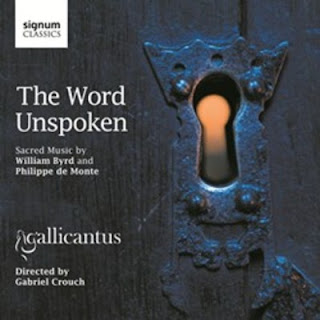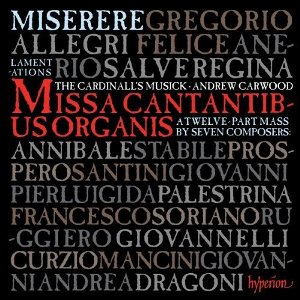The Word Unspoken
Originally written for musicalcriticism.com
07 August 2012
The
extraordinary nature of William Byrd’s life and the impact that it had on his
music has been well documented on disc since the late 60s when, amongst others,
Sir David Willcocks and The Choir of King’s College Cambridge recorded motets
by Byrd And His Contemporaries
(EMI 1965) and Cantores In Ecclesia directed By Michael Howard recorded the Cantiones Sacrae of 1575 over three LPs
(1969 SOL 313). Since then, recordings that have stood out for me include The
Choir of New College Oxford (CRD 1983) with their steely treble sound and, most
recently, the professional vocal ensembles of Andrew Carwood’s The Cardinall's
Musick and David Skinner’s Alamire. These last two in particular have set the
bar extremely high in terms of modern performance standards and through the
clarity and passion of their interpretations they have revealed more of the
layers of Byrd’s genius.
Despite
this rich recorded history, there are two compelling reasons why a new disc
from Galicantus is not
to be overlooked: programming and performance. Starting with the latter, Gallicantus made their debut with an
exceptionally beautiful disc of music by Robert White (Signum: Hymns, Psalms & Lamentations
SIGCD134) which really first bought them to my attention. Their sound could
generally be described as rich and well-blended with a generous bassy tone.
They have two especially fine countertenors (Mark Chambers and David Allsopp)
who manage to be quite present in the texture without ever allowing to the top
line to skew the polyphonic balance. That in itself is worthy of note. Their
second disc was called Dialogues of Sorrow
(SIGCD210) and revealed the second quality – a fine nose for programming from
the director Gabriel Crouch.
This
new disc – The Word Unspoken – delves into the sub-text
of motets by Philippe de Monte and William Byrd. This is not a new discovery;
the relationship between these two composers was discussed in vol. 3 of the
Byrd Edition (Andrew Carwood / The Cardinall's Musick) which ended with the
same two astonishing motets as does this new disc. However, Gallicantus have rightfully spotted
that the connections in the music of these two men has still not been fully
explored and, as such, this disc goes a long way to offering us further
understanding of this fascinating conversation all performed to a high standard
with excellent notes by Sally Dunkley.
It
is well known that de Monte spent time in London travelling with Philip II of
Spain and we can infer that during this time the Spanish composer met William
Byrd because 30 years later he sent him a copy of his motet Super flumina Bablylonis and Byrd
responded in kind by sending his exquisite 8-part Quomodo cantabimus. The motet as a medium for political
subtext is a theme well explored by, amongst others, Craig Monson (see in particular:
"Byrd, the Catholics, and the Motet: the Hearing Reopened." In
Hearing the Motet. New York: Oxford University Press, 1996.). If Babylonian
captivity is a potent symbol for the plight of the persecuted Catholics in
England, then surely the subtext is obvious when de Monte asks Byrd “How shall
we sing the Lord’s song in a strange land” to which the Englishman replies: “If
I forget you, Jerusalem, let my right hand fall idle.”
What has always intrigued me about this particular correspondence is the idea that Byrd might has asked his singers to perform de Monte’s motet. Would the resulting performance have been anything that de Monte himself might have recognized? Might Byrd have remembered idiocyncracies of the Spanish singing style from their visit 30 years previously and asked for them to be applied? And what of de Monte receiving Byrd’s motet in Spain, would be have understood the nuances of the style, or would he have looked first at the text?
This particular pair comes last on the CD and Gallicantus sing both with their confident blend – men’s voices for de Monte and the addition of Amy Moore and Clare Wilkinson for Byrd. I agree that it is best to avoid any appropriation of special ‘Spanish’ flavour for de Monte (he was a displaced Northerner anyway). In fact, de Monte’s motet is one of the best on the disc. However, the famous Byrd response – one of his finest moments - is, for my tastes, simply a touch too fast. Having said that, this speed – much fresher than the iconic Carwood recording - does invite some fresh speculation on the text which has made me realize I had lazily assumed Byrd’s response was wistful. Maybe there is a more positive message at work here after all?
Elsewhere
on the disc these fine performances reveal some fantastic motets by de Monte
and revisit some of Byrd’s finest music – all to an exceptionally high
standard. Gallicantus also offer us a sublime performance Byrd’s finest Ne irascaris Domine. This is one of the
most beautifully poised recordings of this motet that I have ever heard with
alto, Mark Chambers, effortlessly balancing the oaky lower voices with a
silvery tone. Unforgettable.
-->
Gallicantus / Gabriel Crouch (Signum
Classics)



Comments
Post a Comment